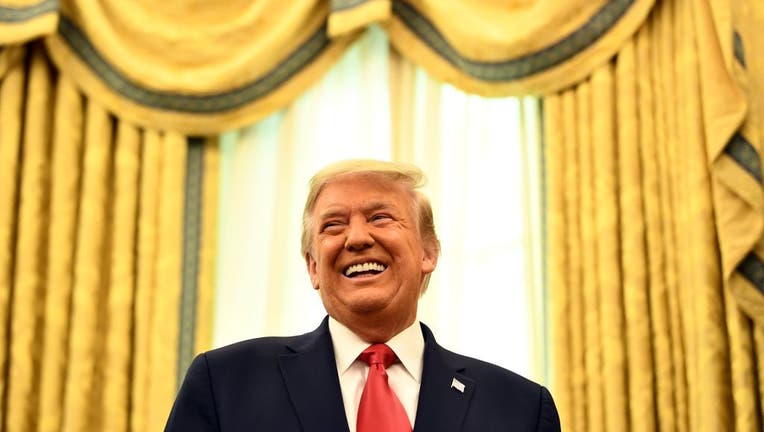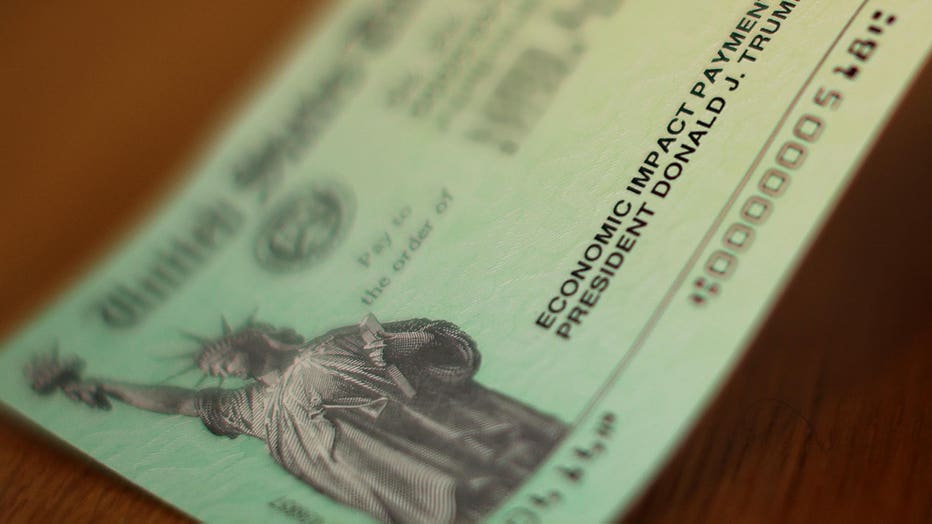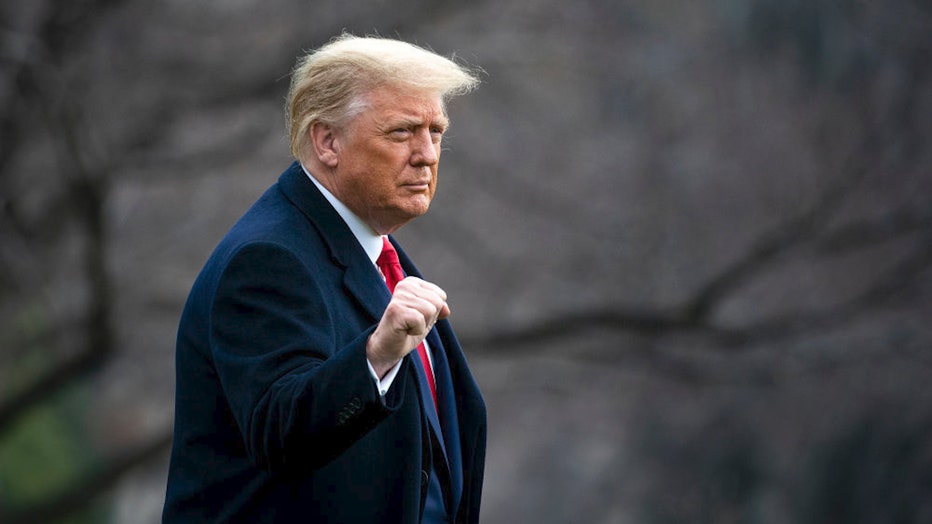COVID relief bill morphs into a test of GOP loyalty to Trump

President Donald Trump (Photo by BRENDAN SMIALOWSKI/AFP via Getty Images)
WASHINGTON, D.C. - Threatening to tank Congress’ massive COVID relief and government funding package, President Donald Trump’s demand for bigger aid checks for Americans confronts Republicans traditionally leery of such spending with an uncomfortable test of allegiance.
On Thursday, House Democrats who also favor $2,000 checks will all but dare Republicans to break with Trump, calling up his proposal for a Christmas Eve vote. The president's last-minute objection could gum up critical legislation amid a raging pandemic and deep economic uncertainty. His attacks risk a federal government shutdown by early next week.
"Just when you think you have seen it all," House Speaker Nancy Pelosi wrote Wednesday in a letter to colleagues.
"The entire country knows that it is urgent for the President to sign this bill, both to provide the coronavirus relief and to keep government open."
Republicans led by Senate Majority Leader Mitch McConnell have resisted $2,000 checks as too costly. They have not said if they will block the vote.

President Donald Trump's name appears on the coronavirus economic assistance checks that were sent to citizens across the country April 29, 2020. (Chip Somodevilla/Getty Images)
The president's last-minute objections are setting up a defining showdown with his own Republican Party in his final days in office.
Rather than take the victory of the sweeping aid package, among the biggest in history, Trump is lashing out at GOP leaders over the presidential election — for acknowledging Joe Biden as president-elect and rebuffing his campaign to dispute the Electoral College results when they are tallied in Congress on Jan. 6.
The president’s push to increase direct payments for most Americans from $600 to $2,000 for individuals and $4,000 for couples splits the party with a politically painful loyalty test, including for GOP senators David Perdue and Kelly Loeffler, fighting to retain their seats in the Jan. 5 special election in Georgia.
Republican lawmakers traditionally balk at big spending and many never fully embraced Trump’s populist approach. Their political DNA tells them to oppose a costlier relief package. But now they're being asked to stand with the president.
GOP leaders were silent Wednesday, with neither McConnell nor Rep. Kevin McCarthy, the House minority leader, responding to requests for comment.
Jon Ossoff, Perdue’s Democratic opponent, tweeted simply on Tuesday night: "$2,000 checks now."

President Donald Trump
As Congress left town for the holidays, the year-end package was part of a hard-fought compromise, a massive 5,000-plus page bill that includes the COVID aid and $1.4 trillion to fund government agencies through September and address other priorities.
The relief bill Trump is criticizing would establish a temporary $300 per week supplemental jobless benefit, along with a new round of subsidies for hard-hit businesses, restaurants and theaters and money for schools, health care providers and renters facing eviction.
Even though Treasury Secretary Steven Mnuchin represented the White House in negotiations, Trump assailed the bipartisan effort in a video he tweeted out Tuesday night, suggesting he may not sign the legislation.
Railing against a range of provisions in the broader government funding package, including foreign aid mainstays included each year, Trump called the bill a "disgrace."
Trump did not specifically vow to use his veto power, and there may be enough support in Congress to override him if he does. But the consequences would be severe if Trump upends the legislation, including no federal aid to struggling Americans and small businesses, and no additional resources to help with vaccine distribution. To top it off, because lawmakers linked the pandemic relief bill to an overarching funding measure, the government would shut down on Dec. 29.
The final text of the more than 5,000-page bill was still being prepared by Congress and was not expected to be sent to the White House for Trump’s signature before Thursday or Friday, an aide said.
FREE DOWNLOAD: Get breaking news alerts in the FOX6 News app for iOS or Android
That complicates the schedule ahead. Under normal circumstances, a bill that has not been vetoed becomes law after 10 days. But it could face a "pocket veto" if Congress adjourns during that time, as it will be expected to do before the new Congress convenes Jan. 3.
A stopgap funding bill Congress approved while the paperwork was being compiled is keeping the government funded through midnight Monday, when its expiration risks a federal shutdown.
Pelosi and Democrats said they fought for the higher stipends during protracted negotiations only to settle on the lower number when Republicans refused.
Lawmakers spent months in a stalemate over pandemic relief funds, even as COVID-19 cases soared across the country. Trump had pushed for higher payments to Americans — drawing rare common ground with most liberals — but Democrats ultimately compromised with reluctant Republicans to allow a deal to proceed.
Pelosi said she would offer the president’s proposal under a procedure that allows just one lawmaker to object to its consideration. It will be pushed forward during a so-called pro forma session, with few lawmakers expected to attend.
"At last, the President has agreed to $2,000. Democrats are ready to bring this to the Floor this week by unanimous consent. Let’s do it!," Pelosi said in an earlier tweet.
Republicans have been reluctant to spend more on pandemic relief and only agreed to the big year-end package as time dwindled for a final deal. Sen. Chuck Schumer, the Senate Democratic leader, said that "Trump needs to sign the bill to help people and keep the government open," and Congress would step up for more aid after.
Shortly after castigating the relief bill, Trump criticized McConnell and Sen. John Thune, the No. 2 Senate Republican, who has also said any effort to overturn Biden's victory would be futile.
Trump's threats to hold up the pandemic legislation could also complicate matters for Republicans in Georgia, where two runoff races to determine control of the Senate will be held in January. Sens.
The Senate cleared the huge relief package by a 92-6 vote after the House approved it by 359-53. Those votes totals would be enough to override a veto should Trump decide to take that step.
Biden applauded lawmakers for their work. He described the package as far from perfect, "but it does provide vital relief at a critical time."
He also said more relief would be needed in the months ahead.

